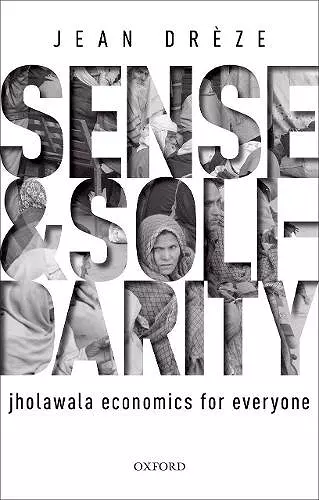Sense and Solidarity
Jholawala Economics for Everyone
Format:Hardback
Publisher:Oxford University Press
Published:28th Feb '19
Currently unavailable, and unfortunately no date known when it will be back

This is an open access title available under the terms of a CC BY-NC-ND 4.0 licence. It is free to read at Oxford Scholarship Online and offered as a free PDF download from OUP and selected open access locations. Jean Drèze has a rare and distinctive understanding of the Indian economy and its relationship with the social life of ordinary people. He has travelled widely in rural India and done fieldwork of a kind that few economists have attempted. In Sense and Solidarity Drèze offers unique insight on issues of hunger, inequality, conflict, and the evolution of social policy in India over roughly the past two decades. Historic legislations and initiatives of the period, relating for instance to the right to food and the right to work, are all scrutinised and explained, as are the fierce debates that often accompanied them. "Jholawala" has become a disparaging term for activists in the Indian business media. This book affirms the learning value of collective action combined with sound economic analysis. In his detailed introduction, the author argues for an approach to development economics where research and action are complementary and interconnected.Sense and Solidarity spans the gamut of critical social policies, from education and health to poverty, nutrition, child care, corruption, employment, and social security. There are also less predictable topics such as the caste system, corporate power, nuclear disarmament, the Gujarat model, the Kashmir conflict, and universal basic income. Sense and Solidarity enlarges the boundaries of social development towards a broad concern with the sort of society we want to create.
Jean Drèze is one of the world's finest development economists. He works in a space that is widely but incorrectly ignored by most. The practical implications of evidence-based economics cannot be worked through without engaging all of society in democratic discussion, including (especially) those who are working for change. Economics itself fails without that engagement. In this collection of beautiful essays, some previously unpublished, Drèze uses economics, philosophy, and his extensive practical experience to illuminate the whole range of social policy in India. Read on! * Angus Deaton, Nobel Laureate, Economic Sciences, 2015 *
Anyone with any interest in the fate of democracy and development in India should buy the book at once. * Ramachandra Guha, The Telegraph *
It is this combination of passion and humour, of sincerity and argumentativeness, that makes Jean Drèze's book such a compelling read. You may not always agree with the happy warrior, but you have to engage with him. Besides, he is good company! * Maitreesh Ghatak, NDTV *
Economist Jean Drèze's new book makes an increasingly necessary argument that creating a morally good, progressive society is as important as improving traditional development indexes. * Nilanjana Roy, BBC *
I have learned a lot from reading the articles in this book as they came out over the years and really enjoyed reading the introduction on social development, democracy, research, and action as Jean was working on it. It has some very important words of wisdom and experience for aspiring jholawala economists. * Diane Coffey, Executive Director, Research Institute for Compassionate Economics *
Beautifully produced, with a catchy and moving introduction this collection is a pleasure to read. Drèze writes elegantly and passionately, shorn of rhetoric, arguing that we see India from the lens of the marginalised. * Ashiwini Desphande, Indian Express *
This collection of Drèze's essays, originally published in the opinion pages of news publications between 2000 and 2017, offers a remarkable view of these tumultuous years. * Supriya Sharma, Scroll *
When an objective economic history of modern India is written, jholawalas will rub shoulders with post-independence socialism of Nehru and the Fund-Bank nudged reforms of 1990s. The right-based schemes, the debates regarding universal basic income and formulation of public policy through a democratic process owe a huge intellectual debt to the jholawalas, of which Jean Drèze is a giant. * Sunil Bahri, Outlook *
...a wonderful writer who reminds me of George Orwell... But Drèze is Orwell Plus, because he is also an economist and has been an important participant in some of the most interesting social change episodes in recent Indian history... All in all a wonderful book and an indispensable man. * Duncan Green, Oxfam blogs *
Drèze writes lucidly with a lot of passion on issues that really impact India. * Vivek Kaul *
The book may be seen as a bridge between the more standard economics texts and the more lucid narratives of the struggles of marginalized people, such as Arundhati Roy's Broken Republic, which also deals with topics such as poverty, tribal rights. and government policy. * Tadit Kundu, Livemint *
This book is admirable in many ways and deserves its popularity in India * Keith Hart, Economic and Political Weekly *
The scholarly contributions of Jean Drèze over the last two decades have significantly shaped our understanding of the extent and nature of poverty and social vulnerability across India * Prithviraj Guha, The Telegraph *
ISBN: 9780198833468
Dimensions: 217mm x 146mm x 25mm
Weight: 554g
358 pages